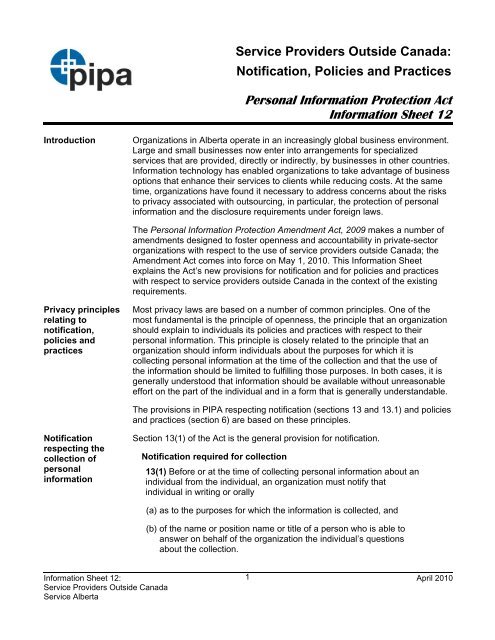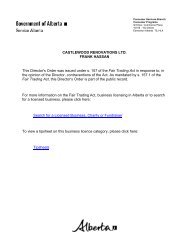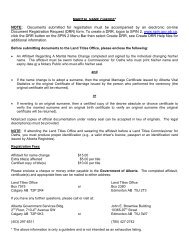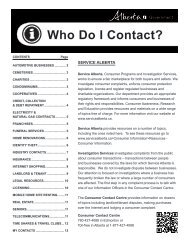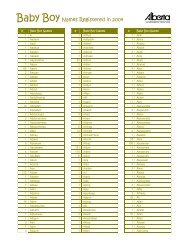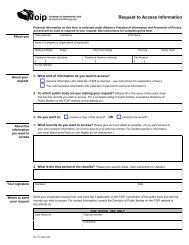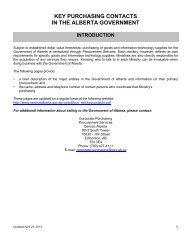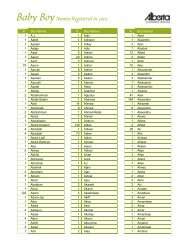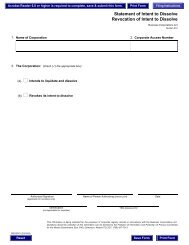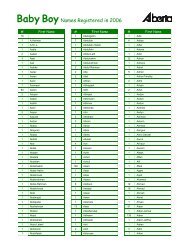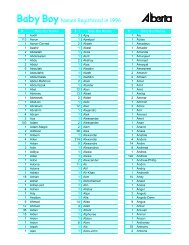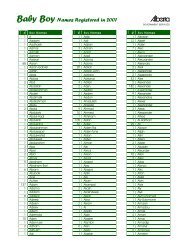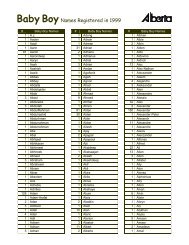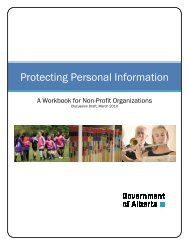PIPA Information Sheet 12 Notification, Policies ... - Service Alberta
PIPA Information Sheet 12 Notification, Policies ... - Service Alberta
PIPA Information Sheet 12 Notification, Policies ... - Service Alberta
Create successful ePaper yourself
Turn your PDF publications into a flip-book with our unique Google optimized e-Paper software.
Section 13(1) requires an organization to inform the individual of the purposesfor which the individual’s personal information is being collected. Thisrequirement applies only when an organization is collecting personal informationdirectly from the individual.An organization is not required to provide notification to the individual when theorganization is authorized to collect the individual’s personal information fromanother person (e.g. a landlord can collect personal information about a tenantfrom the tenant’s neighbour, without the tenant’s consent, and withoutnotification, to investigate a breach of a lease).An organization is also not required to provide notification if an individual’sconsent to the collection of his or personal information is “deemed” (section13(4)). An individual’s consent is deemed (or implied) when the individualvoluntarily provides information to the organization and it is reasonable to do so.For example, an individual may volunteer a credit card to make a payment. TheAct considers the individual to have given implied consent to the use of the creditcard information to process the payment. <strong>Notification</strong> is not required because thepurpose is obvious. However, an organization would have to obtain expressconsent and provide notification if the organization was collecting the informationfor an additional purpose that was not obvious (e.g. to create a customer list formarketing).An organization should define the purposes for collecting personal information asclearly and narrowly as possible so the individual can understand how theorganization will use or disclose the information. Some purposes for which anorganization might collect personal information include opening an account,registering a warranty and guaranteeing a travel reservation.<strong>Notification</strong> must be given before or at the time the personal information iscollected and may be given in writing or orally. There are many ways of providingnotification. For example, an organization may provide notification in writing byincluding information about the purpose of collection on a form (print orelectronic) that is used to collect the information. <strong>Notification</strong> may be providedorally when collecting personal information during a phone call. (Organizationsnotifying individuals orally may find it advisable to use a script and to have thestaff member record that the notice was given. A clear practice regarding oralnotification can be helpful in the case of any misunderstanding.)When giving notification, the organization must provide contact information for aperson who can answer questions about the collection of personal information.The person in this role should be someone who is knowledgeable about theorganization’s purpose for collecting the information. The contact information caninclude the person’s name or position title (using the position title on forms mayassist in reducing the need for updating).An organization has a positive duty to provide notification under <strong>PIPA</strong>. The<strong>Information</strong> and Privacy Commissioner has noted that notification cannot beinferred (<strong>PIPA</strong> Order P2006-008).<strong>Information</strong> <strong>Sheet</strong> <strong>12</strong>: 2April 2010<strong>Service</strong> Providers Outside Canada<strong>Service</strong> <strong>Alberta</strong>
<strong>Notification</strong>respecting serviceproviders outsideCanadaSection 13.1 establishes a new duty to notify, in addition to the generalrequirement under section 13. Where an organization uses a service provideroutside Canada to collect, use or disclose personal information, section 13.1requires the organization to notify individuals as to how they can obtaininformation about the organization’s policies and practices with respect to theservice provider.<strong>Notification</strong> respecting service provider outside Canada13.1(1) Subject to the regulations, an organization that uses a serviceprovider outside Canada to collect personal information about anindividual for or on behalf of the organization with the consent of theindividual must notify the individual in accordance with subsection (3).(2) Subject to the regulations, an organization that, directly orindirectly, transfers to a servicer provider outside Canada personalinformation about an individual that was collected with the individual’sconsent must notify the individual in accordance with subsection (3).(3) An organization referred to in subsection (1) or (2) must, before orat the time of collecting or transferring the information, notify theindividual in writing or orally of(a) the way in which the individual may obtain access to writteninformation about the organization’s policies and practiceswith respect to service providers outside Canada, and(b) the name or position name or title of a person who is ableto answer on behalf of the organization the individual’squestions about the collection, use, disclosure or storage ofpersonal information by service providers outside Canadafor or on behalf of the organization.(4) The notice required under this section is in addition to any noticerequired under section 13.“<strong>Service</strong> provider” means any organization, including, without limitation, a parentcorporation, subsidiary, affiliate, contractor or subcontractor, that, directly orindirectly, provides a service for or on behalf of another organization (section1(1)(m.3))A “parent corporation” is a corporation that controls another corporation(Dictionary of Canadian Law).A “subsidiary” is a corporation which, in respect of another corporation, iscontrolled, either directly or indirectly, by that other corporation (Dictionary ofCanadian Law).An “affiliate” is a corporation that is related to another corporation byshareholdings or other means of control; a subsidiary, parent, or siblingcorporation (Black’s Law Dictionary).<strong>Information</strong> <strong>Sheet</strong> <strong>12</strong>: 3April 2010<strong>Service</strong> Providers Outside Canada<strong>Service</strong> <strong>Alberta</strong>
It is important to note that the term “service provider” is not limited to anorganization providing services under contract with the principal organization; aservice provider may be a subcontractor. A service provider may also be aparent corporation, a subsidiary or an affiliate. A service provider would notinclude an employee located in another country or an employee travelling onbusiness.There are no regulations relating to section 13.1. Circumstances in which notification is required – collecting personalinformationSection 13.1(1) requires an organization to notify an individual if a serviceprovider outside Canada will collect the individual’s personal information onbehalf of the organization. This requirement applies only when the organizationis collecting the personal information with the individual’s consent. If theorganization is collecting personal information without consent (and is authorizedto do so under section 14 of <strong>PIPA</strong>), the organization is not required to notify theindividual.For example, a retail business that sells computers may offer its customers atechnical support service that provides assistance online or by telephone fromanother country. Since the service provider outside Canada would have tocollect some customer personal information, the retail business would berequired to notify the customer. On the other hand, an organization taking legalaction against an individual, and using the legal services of a parent corporationin another country to do so, would not be required to notify the individual aboutthe collection of the individual’s personal information. Consent for the collectionof information related to the legal action is not required, so notification is notrequired. Circumstances in which notification is required – transferring personalinformationSection 13.1(2) requires an organization to notify an individual if theorganization transfers the individual’s personal information – directly or indirectly– to a servicer provider outside Canada. This requirement applies only where theindividual originally gave the principal organization consent for the collection ofhis or her personal information. Section 13.1(2) applies even if the organizationdoes not transfer the personal information directly to the service provider.For example, an organization may contract with a business that provides a suiteof business services, such as accounts, collections and customer relationshipmanagement. That business subcontracts for some services with a serviceprovider based in India and transfers the personal information to India for thepurpose of providing those services. The principal organization would berequired to notify individuals whose personal information will be transferred tothe service provider in India.On the other hand, if the local contractor allows the subcontractor’s employees inIndia to access the information online but not to store it in India, the principalorganization would likely not be required to provide notification. For practicalpurposes, this arrangement would not involve the transfer of any personal<strong>Information</strong> <strong>Sheet</strong> <strong>12</strong>: 4April 2010<strong>Service</strong> Providers Outside Canada<strong>Service</strong> <strong>Alberta</strong>
information to India; all the information would remain in Canada.The following are some circumstances where notification is not required.• Transmission of information through an internet service provider (ISP).Section 13.1 applies only where there is a collection of personal informationon behalf of the organization by a service provider outside Canada, or wherethere is a transfer to a service provider. An ISP is not collecting personalinformation on the organization’s behalf. Nor is the information beingtransferred to the ISP.• Transfer of credit card information to a customer’s credit card company.A credit card company is not the organization’s service provider. Thecustomer has entered into a relationship with the credit card company, whichis collecting the personal information on its own behalf.• Personal employee information that is collected, used or disclosed withoutconsent in accordance with <strong>PIPA</strong>’s provisions for employee information.<strong>Notification</strong> under section 13.1 is required under the Act only when personalinformation is collected with the individual’s consent.If an organization contracts with a business that subcontracts with a serviceprovider outside Canada to collect, use or disclose personal information onbehalf of the organization, the organization may find it helpful to include contractclauses requiring the business to give the organization the right to approve theuse of a service provider outside Canada, or to obtain the organization’sapproval for any change to a service provider outside Canada. To ensure theorganization’s compliance with <strong>PIPA</strong>, the contract should at least require thebusiness to inform the principal organization when it changes from asubcontractor in one country to a subcontractor in another country.It should be noted that <strong>PIPA</strong> will not require an organization to obtain theindividual’s consent to its use of a service provider outside Canada. What information must be included in the notificationIf section 13.1(1) or (2) applies to an organization, that organization must notifythe individual in accordance with section 13.1(3).The information to be provided in the notice to the individual is fairly minimal.The notification• should indicate that the organization uses a service provider outside Canadato collect or process personal information for a specified purpose,• must state how the individual can access written information about theorganization’s policies and practices regarding service providers outsideCanada (e.g. provide a website address),• must provide contact information for a person who can answer theindividual’s questions about the collection, use, disclosure or storage ofpersonal information by the service provider outside Canada.<strong>Information</strong> <strong>Sheet</strong> <strong>12</strong>: 5April 2010<strong>Service</strong> Providers Outside Canada<strong>Service</strong> <strong>Alberta</strong>
The contact person should be able to inform an individual about the location ofthe service provider and, in general terms, how personal information is collected,used, disclosed or stored, as the case may be, for the purpose for which theindividual’s personal information was collected by the organization. The contactperson should be able to answer questions that are reasonably specific to theindividual’s relationship with the organization. The contact person would not beexpected to provide details of the laws governing the disclosure of personalinformation in the service provider’s country. How notification may be givenThe organization subject to <strong>PIPA</strong> is responsible for ensuring that notification isprovided, but notification may be given by a contractor, including the serviceprovider outside Canada, as long as the notification is given before or at the timean individual’s personal information is collected by or transferred to the serviceprovider.<strong>Notification</strong> may be given in writing or orally. For example, a notification for anew collection of personal information by a service provider outside Canadacould be• provided on a form (print or electronic) used to collect personal information,or• given in a recorded message before an individual is connected with theservice provider for the collection of the individual’s personal information.A notification regarding the transfer of personal information to a service provideroutside Canada could be given at the time of the original collection.If notification regarding a transfer is not given at the time of the originalcollection, or if an organization decides to transfer the personal information to aservice provider outside Canada after the original collection of the personalinformation, the organization may be able to provide the notification when it iscommunicating with the individual on other matters. For example, theorganization could provide the notification• with a customer’s regular statement,• with a subscriber newsletter, or• by e-mail (if the organization normally communicates with the client by e-mail).<strong>Policies</strong> andpracticesThe provision in <strong>PIPA</strong> for policies and practices (section 6) supports the principlethat organizations that collect, use and disclose the personal information ofclients, as well as employees, should be open about their policies and practicesregarding the protection of that personal information. As amended, section 6includes new provisions regarding service providers outside Canada.<strong>Policies</strong> and practices6(1) An organization must develop and follow policies and practicesthat are reasonable for the organization to meet its obligations underthis Act.<strong>Information</strong> <strong>Sheet</strong> <strong>12</strong>: 6April 2010<strong>Service</strong> Providers Outside Canada<strong>Service</strong> <strong>Alberta</strong>
(2) If an organization uses a service provider outside Canada tocollect, use, disclose or store personal information for or on behalf ofthe organization, the policies and practices referred to in subsection(1) must include information regarding(a) the countries outside Canada in which the collection, use,disclosure or storage is occurring or may occur, and(b) the purposes for which the service provider outside Canadahas been authorized to collect, use or disclose personalinformation for or on behalf of the organization.(3) An organization must make written information about the policiesand practices referred to in subsections (1) and (2) available onrequest.<strong>PIPA</strong> requires an organization to turn its attention to the way the Act applies tothe personal information it collects. The Act requires an organization to developand follow policies and practices that are reasonable for the organization to meetits obligations under this Act. An organization’s policies and practices shouldaddress matters that arise regularly in the course of the organization’s business.In most cases, an organization will have internal policies and practices thatemployees have to follow when performing business functions (e.g. opening anaccount for a client). It is generally not helpful, either for the organization or theclient, to make internal policies available to clients. Organizations generallychoose to develop a policy document for clients that focuses on matters ofparticular interest to clients.A model privacy policy, developed by Access and Privacy, <strong>Service</strong> <strong>Alberta</strong>, withsmall businesses in mind, is available athttp://pipa.alberta.ca/resources/doc/PerInfoProtectPolicy.docThe policy is designed for client personal information. Most organizations find itpractical to have a separate policy for employee personal information.The model policy can be adapted to an organization’s needs. It is important toremember that <strong>PIPA</strong> requires an organization to follow its policies and practices.So a policy for clients must represent an organization’s actual practices. Thestandard, as throughout <strong>PIPA</strong>, is to have policies and practices that arereasonable for meeting statutory obligations. <strong>Policies</strong> and practices respecting service providers outside CanadaAn organization may decide to incorporate the required information respectingservices providers outside Canada into a general policy document or have apolicy document that addresses service providers outside Canada separately.The following comments discuss what must be included with respect to serviceproviders, whether within a general policy document or a separate documentrelating to service providers outside Canada.<strong>Information</strong> <strong>Sheet</strong> <strong>12</strong>: 7April 2010<strong>Service</strong> Providers Outside Canada<strong>Service</strong> <strong>Alberta</strong>
The first requirement is that an organization that uses a service provideroutside Canada to process personal information must provide informationregarding the countries outside Canada in which the collection, use, disclosureor storage of personal information is occurring or may occur.The wording is intended to provide some flexibility for organizations that changeservice providers frequently and for organizations that use service providers inmore than one country. At the same time, it is intended that a policy shouldexplain the organization’s practices in ways that are meaningful to individuals.For example, if an organization contracts with a business in <strong>Alberta</strong> thatoutsources certain data processing, such as account applications, to India andArgentina, it would be reasonable to state that the processing of accountapplications may occur in either of those countries. However, if applications fornew accounts are routinely processed in one country and account enquiries arehandled in another country, it would be reasonable to say this.It should be noted that the policy needs to address the storage of personalinformation by a service provider outside Canada (for any purpose, includingback-ups).The second requirement is that an organization that uses a service provideroutside Canada to process personal information must provide informationregarding the purposes for which the service provider has been authorized tocollect, use or disclose personal information for or on behalf of the organization.Informing individuals about the purposes for which service providers outsideCanada are authorized to collect, use or disclose personal information is likely torequire more detail than informing individuals about the purposes for which anorganization is collecting personal information.For example, a section in a policy relating to an organization’s purposes forcollecting personal information might explain that an organization collectspersonal information for the purpose of operating a loyalty program. A section ina policy respecting the use of service providers outside Canada might need to bemore specific, stating, for example, that personal information is transferred to aservice provider in the United States to process customer transaction informationfor the purpose of keeping the customer’s loyalty program account up to date.An organization is not required to provide information about any possibledisclosure by a service provider that is not authorized by the organization andover which the organization would have no control, such as a law compelling theproduction of records for a law enforcement purpose.As with policies and practices generally, an organization is not required to makeits internal policies and practices for managing its business relationships,including information about contracts with service providers, available to clients.Although an organization is not required to make business information about itscontracts available to clients, an organization may choose to include in its policy<strong>Information</strong> <strong>Sheet</strong> <strong>12</strong>: 8April 2010<strong>Service</strong> Providers Outside Canada<strong>Service</strong> <strong>Alberta</strong>
for clients a statement that the organization is responsible for the serviceprovider’s compliance (<strong>PIPA</strong> section 5(2)). Also, the organization may choose tolet clients know that the organization uses contractual or other means to providea comparable level of protection to personal information that is collected by, ortransferred to, the service provider.For most organizations, the most convenient and cost-effective way to providecurrent information about policies and practices is to post the information on theorganization’s website. It is considered a good practice to have a clear link to thisinformation from every page. The organization should have a process forregularly reviewing and updating information about policies and practices.Other resourcesPersonal <strong>Information</strong> Protection Policy for Small and Medium-Size BusinessesPublications are available on-line from:Access and Privacy<strong>Service</strong> <strong>Alberta</strong>pipa.alberta.caThe website of the Office of the <strong>Information</strong> and Privacy Commissioner alsocontains resources, at www.oipc.ab.ca.This <strong>Information</strong> <strong>Sheet</strong> was prepared to assist organizations that are subject to thePersonal <strong>Information</strong> Protection Act. This document is an administrative tool intendedto assist in understanding the Act. It is not intended as, nor is it a substitute for, legaladvice. For the exact wording and interpretation of the Act, please read the Act in itsentirety. This <strong>Information</strong> <strong>Sheet</strong> is not binding on the Office of the <strong>Information</strong> andPrivacy Commissioner of <strong>Alberta</strong>.<strong>Information</strong> <strong>Sheet</strong> <strong>12</strong>: 9April 2010<strong>Service</strong> Providers Outside Canada<strong>Service</strong> <strong>Alberta</strong>


